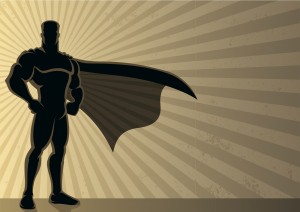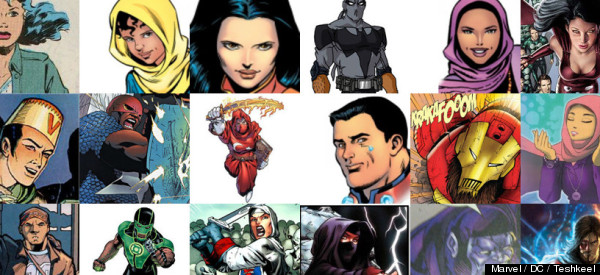On the heels of ReligionLink’s less-than-comprehensive topical overview of religion and comics, The Huffington Post recently made its own attempt. Written by Professor S. Brent Plate, an expert on religion and American visual culture, kept his commentary narrow and targeted on the Judaic elements. While not pioneering new trails in the exploration of the medium (and the superhero genre) in terms of Judaism, Plate does bring the discussion largely up to date on the eve of Superman’s latest film incarnation in Man of Steel. One suspects, though, that if there’s something new or more to say on what Plate calls “the sacredness of superheroes,” it’ll come from outside Judeo-Christian discourse.
All posts by A. David
ReligionLink Targets Comics, Misses a Lot
ReligionLink.com is, by its own description, “a non-partisan service of Religion Newswriters” that is “by journalists, for journalists.” So, it’s understandable that they encourage religion writers to think further on the intersection of the comics-based genre of superheroes and religion in recognition of Superman’s 75th anniversary and new film. Clearly, Rao endorses this viewpoint, too.
However, the “background and expert sources” they claim to provide prove sadly lacking; though lengthy and exhaustive-looking, it reads as the result of Google searching and Amazon browsing rather than an actual, knowledgeable resource. Their list of recommended books leaves out any title that isn’t Judeo-Christian, and, similarly, their article list includes one mention of Islam in regards to coverage of The 99; likewise, their manifest of three dozen experts seems to only include one focusing on Arabs (the esteemed Fedwa Malti-Douglas) and one on occult practices (the weirdly unattributed Christopher Knowles). They even get Professor Malti-Douglas’s URL wrong!
But it’s easy to criticize. What else should have been there? Well… Continue reading ReligionLink Targets Comics, Misses a Lot
Comics Remain Important — and Varied!
Over the course of the past year, various pieces — pertinent both to comics in terms of religion specifically or simply the serious consideration of comics — have come to light that either fell through the cracks at the time or deserve some wider coverage. They include:
- Back in mid-2006, Today.com reporter M. Alex Johnson took a look, albeit a superficial one, at the religiosity of Spider-Man, The Thing, X-Men villain Rev. Stryker, the Atheist and others with “At the Comics Shop, Religion Goes Graphic.”
- Graphic Medicine, founded by Ian Williams in 2007, was relaunched with MK Czerwiec in 2012, and they caught the “Graphic Fiction” panel (moderated by Shelly Wall) at the Toronto Comics & Medicine conference that year. Presenters included Steven Bergson with “From Ivanhoe to Rex Mundi: Jews and Medicine in Comic Books, Comic Strips, and Graphic Novels,” Jeffrey Monk with “A Ghost of an Idea: A Reflection on My Comic Adaptation of ‘A Christmas Carole’ for the Medical Humanities,” and Lorenzo Servitje with “Empathy in the gutter: Participatory delusion in graphic adaptation of Shutter Island.”
- Read the Spirit, an “online magazine covering religion and cultural diversity” as well as an extension of Dr. Wayne Baker’s Our Values program, answered the question to “Why Comics and Comic Books Are Important Today!” — and the solution seems to be “independent comics artist and author” Kurt Kolka.
- Most recently, Gene Yang of Comics in Education provided a valuable, digest-sized overview of the “History of Comics in Education,” spanning from 1933 to the turn of the 21st century — an adjacent topic to Religion & Comics but relevant and useful for a sense as to how serious academic discussion has arisen not only in but also for the classroom.
And then there’s just this odd/funny/insulting/compelling comic from Kevin Moore’s In Contempt comics from back in 2008. No better place to put it than here:

Boston Professor Uses X-Men Character Costume to Illuminate Islamophobia after Marathon Bombing
 In the wake of the Boston Marathon Bombing and capture of suspect Dzhokhar Tsarnaev, Boston University Associate Professor Kecia Ali was invited as a guest blogger for NPR affiliate WBUR’s Cognoscenti where she recounted not only running a 5-kilometer fundraiser with a “Heroes and Villains” theme but also having to convince a fellow runner that her costume as Dust of the X-Men was actually heroic.
In the wake of the Boston Marathon Bombing and capture of suspect Dzhokhar Tsarnaev, Boston University Associate Professor Kecia Ali was invited as a guest blogger for NPR affiliate WBUR’s Cognoscenti where she recounted not only running a 5-kilometer fundraiser with a “Heroes and Villains” theme but also having to convince a fellow runner that her costume as Dust of the X-Men was actually heroic.
Dust, of course, brings the veil front and center. She may be a rare positive representation of a Muslim woman in comic books, but her character is affected by Orientalism and sexism. Does she break down stereotypes, or does she reinforce them?
Ali pointed to an earlier writing by blogger Broken Mystic on the character of Dust and the complexities her portrayals present:
So overall, can we appreciate a character like Dust? I think we can; however, there is a lot of room for improvement. […H]er character is incomplete and her character suffers from stereotypes that are due to misunderstandings about Islamic beliefs and practices.
What with the recent headlines generated by DC Comics’ introduction of Simon Baz as a new Green Lantern, are Marvel Comics readers likely to be reintroduced to Dust anytime soon?
Huffington Post Features Muslim Superheroes — VOTE NOW!
Thirty-two of the comics world’s Muslim superheroes — and who thought there were that many, really? — are profiled in the Huffington Post‘s Religion section, squaring off in March Madness brackets-style.
Characters from Marvel Comics, DC Comics, Teshkeel Media, and a host of other, independent publishers are all featured as readers vote on who will advance to face each other. Which hero has what it takes to be the finest Muslim superhero out there? (And how many did you know already, eh?)
The Tournament will be running all through the NCAA finals into April. Voting is free and open to all!


